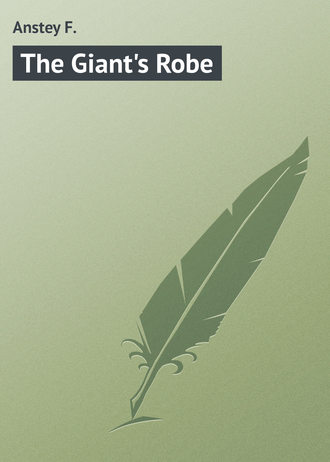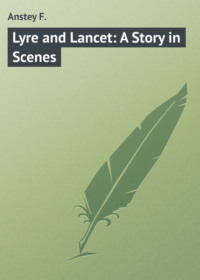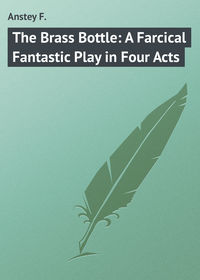
'I see now,' he said; 'I thought there must be someone at the bottom of this; someone who, for purposes of his own, has contrived to put things in the worst light for me. If you can condescend to listen to slanderers, Mabel, I shall certainly not condescend to defend myself.'
'Oh, I will tell you his name,' she said, 'and then even you will have to own that he had no motive for doing what he did but natural goodness and kindness. I doubt even if he has ever met you in his life; the man who rescued our Dolly from what you had made her is Mr. Mark Ashburn, the author of 'Illusion' (her expression softened slightly, from the gratitude she felt, as she spoke his name, and Caffyn noted it). 'If you think he would stoop to slander you– But what is the use of talking like that? You have owned it all. No slander could make it any worse than it is!'
'If you think as badly of me as that,' said Caffyn, who had grown deadly pale, 'we can meet no more, even as acquaintances.'
'That would be my own wish,' she replied.
'Do you mean,' he asked huskily, 'that – that everything is to be over between us? Has it really come to that, Mabel?'
'I did not know that there ever was anything between us, as you call it,' she said. 'But of course, after this, friendship is impossible. We cannot help meeting. I shall not even tell my mother of this, for Dolly's sake, and so this house will still be open to you. But if you force me to protect Dolly or myself, you will come here no more.'
Her scornful indifference only filled him with a more furious desire to triumph over it; he had felt so secure of her that morning, and now she had placed this immeasurable distance between them. He had never felt the full power of her beauty till then, as she stood there with that haughty pose of the head and the calm contempt in her eyes; he had seen her in most moods – playfully perverse, coldly civil, and unaffectedly gracious and gentle – and in none of them had she made his heart ache with the mad passion that mastered him now.
'It shall not end like this!' he said violently; 'I won't let you make a mountain of a molehill in this way, Mabel, because it suits you to do so. You have no right to judge me by what a child chooses to imagine I said!'
'I judge you by the effects of what you did say. I can remember very well that you had a cruel tongue as a boy – you are quite able to torture a child with it still.'
'It is your tongue that is cruel!' he retorted; 'but you shall be just to me. I love you, Mabel – whether you like it or not – you shall not throw me off like this. Do you hear? You liked me well enough before all this! I will force you to think better of me; you shall own it one day. No, I'm mad to talk like this – I only ask you to forgive me – to let me hope still!'
He came forward as he spoke and tried to take her hands, but she put them quickly behind her. 'Don't dare to come nearer!' she said; 'I thought I had made you feel something of what I think of you. What can I say more? Hope! do you think I could ever trust a man capable of such deliberate wickedness as you have shown by that single action? – a kind of malice that I hardly think can be human. No, you had better not hope for that. As for forgiving you, I can't even do that now; some day, perhaps, when Dolly has quite forgotten, I may be able to forget too, but not till then. Have I made you understand yet? Is that enough?'
Caffyn was still standing where she had checked his advance; his face was very grey and drawn, and his eyes were fixed on the Eastern rug at his feet. He gave a short savage laugh. 'Well, yes,' he said, 'I think perhaps I have had enough at last. You have been kind enough to put your remarks very plainly. I hope, for your own sake, I may never have a chance of making you any return for all this.'
'I hope so too,' she said; 'I think you would use it.'
'Thanks for your good opinion,' he said, as he went to the door. 'I shall do my best, if the time comes, to deserve it.'
She had never faltered during the whole of this interview. A righteous anger had given her courage to declare all the scorn and indignation she felt. But now, as the front door closed upon him, the strength that had sustained her so long gave way all at once; she sank trembling into one of the low cushioned chairs, and presently the reaction completed itself in tears, which she had not quite repressed when Dolly came in to look for her.
'Has he gone?' she began; and then, as she saw her sister's face, 'Mabel! Harold hasn't been bullying you?'
'No, darling, no,' said Mabel, putting her arms round Dolly's waist. 'It's silly of me to cry, isn't it? for Harold will not trouble either of us again after this.'
Meanwhile Harold was striding furiously down the other side of the hill in the direction of Kensal Green, paying very little heed where his steps might be leading him, in the dull rage which made his brain whirl.
Mabel's soft and musical voice, for it had not ceased to be that, even when her indignation was at its highest, rang still in his ears. He could not forget her bitter scornful speeches; they were lashing and stinging him to the soul.
He had indeed been hoist with his own petard; the very adroitness with which he had contrived to get rid of an inconvenient rival had only served to destroy his own chances for ever.
He knew that never again would Mabel suffer him to approach her on the old friendly footing – it would be much if she could bring herself to treat him with ordinary civility – he had lost her for ever, and hated her accordingly from the bottom of his heart. 'If I can ever humble you as you have humbled me to-day, God help you, my charming Mabel!' he said to himself. 'To think that that little fool of a child should have let out everything, at the very moment when I had the game in my own hands! I have to thank that distinguished novelist, Mr. Mark Ashburn, for that, though; he must trouble himself to put his spoke in my wheel, must he? I shan't forget it. I owe you one for that, my illustrious friend, and you're the sort of creditor I generally do pay in the long run.'
Only one thing gave him a gleam – not of comfort, precisely, but gloomy satisfaction; his man[oe]uvre with the letter had at least succeeded in keeping Holroyd apart from Mabel. 'He's just the fellow to think he's jilted, and give her up without another line,' he thought; 'shouldn't wonder if he married out there. Miss Mabel won't have everything her own way!'
He walked on, past the huge gasometers and furnaces of the Gas Company, and over the railway and canal bridges, to the Harrow Road, when he turned mechanically to the right. His eyes saw nothing – neither the sluggish barges gliding through the greasy black stream on his right, nor the doleful string of hearses and mourning coaches which passed him on their way to or from the cemetery. It was with some surprise that, as he began to take note of his surroundings again, he found himself in Bayswater, and not far from his own rooms. He thought he might as well return to them as not, and as he reached the terrace in which he had taken lodgings, he saw a figure coming towards him that seemed familiar, and in whom, as he drew nearer, he recognised his uncle, Mr. Antony Humpage. He was in no mood to talk about indifferent topics just then, and if his respected uncle had only had his back instead of his face towards him, Caffyn would have made no great effort to attract his attention. As it was, he gave him the heartiest and most dutiful of welcomes. 'You don't mean to say you've actually been looking me up?' he began; 'how lucky that I came up just then – another second or two and I should have missed you. Come in, and let me give you some lunch?'
'No, my boy, I can't stay long. I was in the neighbourhood on business, and I thought I'd see if you were at home. I won't come up again now, I must get back to my station. I waited for some time in those luxurious apartments of yours, you see, thinking you might come in. Suppose you walk a little way back with me, eh? if you've no better engagement.'
'Couldn't have a better one,' said Caffyn, inwardly chafing; but he always made a point of obliging his uncle, and for once he had no reason to consider his time thrown away. For, as they walked on together in the direction of the Edgware Road, where the old gentleman intended to take the Underground to King's Cross, Mr. Humpage, after some desultory conversation on various subjects, said suddenly, 'By the way, you know a good many of these writing fellows, Harold – have you ever come across one called Mark Ashburn?'
'I've met him once,' said Caffyn, and his brows contracted. 'Wrote this new book, "Illusion," didn't he?'
'Yes, he did – confound him!' said the other warmly, and then launched into the history of his wrongs. 'Perhaps I oughtn't to say it at my age,' he concluded, 'but I hate that fellow!'
'Do you though?' said Caffyn with a laugh; 'it's a singular coincidence, but so do I.'
'There's something wrong about him, too,' continued the old man; 'he's got a secret.'
('So have most of us!' thought his nephew.) 'But what makes you think so?' he asked aloud, and waited for the answer with some interest.
'I saw it in the fellow's face; no young man with a clear record ever has such a look as he had when I came in. He was green with fear, sir; perfectly green!'
'Is that all?' and Caffyn was slightly disappointed. 'You know, I don't think much of that. He might have taken you for a dun, or an indignant parent, or something of that sort; he may be one of those nervous fellows who start at anything, and you came there on purpose to give him a rowing, didn't you?'
'Don't talk to me,' said the old man impatiently; 'there's not much nervousness about him– he's as cool and impudent a rascal as ever I saw when he's nothing to fear. It was guilt, sir, guilt. You remember that picture of the Railway Station, and the look on the forger's face when the detectives lay hold of him at the carriage door? I saw that very look on young Ashburn's face before I'd spoken a dozen words.'
'What were the words?' said Caffyn. 'Proceed, good uncle, as we say in our profession; you interest me much!'
'I'm sure I forget what I said – I was out of temper, I remember that. I think I began by asking him for the real name of the author of the book.'
Again Caffyn was disappointed. 'Of course he was in a funk then; he knew he had put you into it. So you say at least; I've not read the book myself.'
'It wasn't that at all, I tell you,' persisted the old man obstinately; 'you weren't there, and I was. D'ye think I don't know better than you? He's not the man to care for that. When he found what I'd really come about he was cool enough. No, no, he's robbed, or forged, or something, at some time or other, take my word for it – and I only hope I shall live to see it brought home to him!'
'I hope it will find him at home when it is,' said Caffyn; 'these things generally find the culprits "out" in more senses than one, to use an old Joe Miller. He would look extremely well in the Old Bailey dock. But this is Utopian, Uncle.'
'Well – we shall see. I turn off here, so good-bye. If you meet that libelling scoundrel again, you remember what I've told you.'
'Yes, I will,' thought Caffyn as he walked back alone. 'I must know more of my dear Ashburn; and if there happens to be a screw loose anywhere in my dear Ashburn's past, I shall do my humble best to give it a turn or two. It's a charming amusement to unmask the perfidious villain, as I suppose I must call myself after to-day, but it was hardly safe to do it if he has his reasons for wearing a domino himself. If I could only think that excellent uncle of mine had not found a mare's nest! And if I can only put that screw on!'
CHAPTER XXI.
A PARLEY WITH THE ENEMY
MR. FLADGATE was one of those domestically inclined bachelors who are never really at ease in rooms or chambers, and whose tastes lead them, as soon as they possess the necessary means, to set up a substantial and well-regulated household of their own. He had a large old-fashioned house in the neighbourhood of Russell Square, where he entertained rather frequently in a solid unpretentious fashion. At his Sunday dinners especially, one or two of the minor celebrities of the day were generally to be met, and it was to one of these gatherings that Mark was invited, as one of the natural consequences of the success of 'Illusion.' He found himself, on arriving, in company with several faces familiar to him from photographs, and heard names announced which were already common property. There were some there who had been famous once and were already beginning to be forgotten, others now obscure who were destined to be famous some day, and a few, and these by no means the least gifted, who neither had been nor would be famous at any time. There were two or three constellations of some magnitude on this occasion, surrounded by a kind of 'milky way' of minor stars, amongst which the bar, the studios, and the stage were all more or less represented.
Mark, as a rising man who had yet to justify a first success, occupied a position somewhere between the greater and lesser division, and Mr. Fladgate took care to make him known to many of the leading men in the room, by whom he found himself welcomed with cordial encouragement.
Presently, when he had shifted for a moment out of the nearest focus of conversation, his host, who had been 'distributing himself,' as the French say, amongst the various knots of talkers, came bustling up to him. 'Er – Mr. Ashburn,' he began, 'I want you to know a very clever young fellow here – known him from a boy – he's on the stage now, and going to surprise us all some of these days. You'll like him. Come along and I'll introduce him to you; he's very anxious to know you.' And when Mark had followed him as he threaded his way across the room, he found himself hurriedly introduced to the man with the cold light eyes whom he had met at the Featherstones' on the day when he had recognised Mabel Langton's portrait. Mr. Fladgate had already bustled away again, and the two were left together in a corner of the room. Dolly's revelations of the terrorism this man had exercised over her had strengthened the prejudice and dislike Mark had felt on their first meeting; he felt angry and a little uncomfortable now, at being forced to come in contact with him, but there was no way of avoiding it just then, and Caffyn himself was perfectly at his ease.
'I think we have met before – at Grosvenor Place,' he began blandly; 'but I dare say you have forgotten.'
'No,' said Mark, 'I remember you very well; and besides,' he added, with a significance that he hoped would not be thrown away, 'I have been hearing a good deal about you lately from the Langtons – from Miss Langton, that is.'
'Ah!' said Caffyn; 'that would be flattering to most men, but when one has the bad luck, like myself, to displease such a very impulsive young lady as Miss Langton, the less she mentions you the better.'
'I may as well say,' returned Mark coldly, 'that, as to that particular affair in which you were concerned, whatever my opinions are, I formed them without assistance.'
'And you don't care to have them unsettled again by any plea for the defence? That's very natural. Well, with Miss Langton's remarks to guide me, I think I can guess what your own opinion of me is likely to be just now. And I'm going to ask you, as a mere matter of fair play, to hear my side of the question. You think that's very ridiculous, of course?'
'I think we can do no good by discussing it any farther,' said Mark; 'we had better let the matter drop.'
'But you see,' urged Caffyn, 'as it is, the matter has dropped – on me, and really I do think that you, who I understand were the means – of course from the best possible motives – of exposing me as a designing villain, might give me an opportunity of defending myself. I took the liberty of getting Fladgate to bring us together, expressly because I can't be comfortable while I know you have your present impressions of me. I don't expect to persuade Miss Langton to have a little charity – she's a woman; but I hoped you at least would give me a hearing.'
Mark felt some of his prejudice leaving him already; Caffyn had not the air of a man who had been detected in a course of secret tyranny. There was something flattering, too, in his evident wish to recover Mark's good opinion; he certainly ought to hear both sides before judging so harshly. Perhaps, after all, they had been making a little too much of this business. 'Well,' he said at last, 'I should be very glad if I could think things were not as bad as they seem. I will hear anything you would like to say about it.'
'Quite the high moral censor,' thought the other savagely. 'Confound his condescension!'
'I was sure you would give me a chance of putting myself right,' he said, 'but I can't do it now. They're going down to dinner; we will talk it over afterwards.'
At dinner conversation was lively and well sustained, though perhaps not quite so sparkling as might have been expected from such an assembly. As a rule, those who talked most and best were the men who still had their reputation to make, and many of the great men there seemed content to expose themselves to such brilliancy as there was around them, as if silently absorbing it for future reproduction, by some process analogous to the action of luminous paint.
Caffyn was placed at some distance from Mark, and as, after dinner, he was entreated to sit down to the piano, which stood in a corner of the room to which they had adjourned for cigars and coffee, it was some time before their conversation was resumed.
Caffyn was at his best as he sat there rippling out snatches of operatic morceaux, and turning round with a smile to know if they were recognised. His performance was not remarkable for accuracy, as he had never troubled himself to study music, or anything else, seriously, but it was effective enough with a non-critical audience; his voice, too, when he sang, though scarcely strong enough to fill a room of much larger size, was pleasant and not untrained, and it was some time before he was permitted to leave the music-stool.
He rattled off a rollicking hunting song, full of gaiety and verve, and followed it up with a little pathetic ballad, sung with an accent of real feeling (he could throw more emotion into his singing than his acting), while, although it was after dinner, the room was hushed until the last notes had died away, and when he rose at length with a laughing plea of exhaustion, he was instantly surrounded by a buzz of genuine gratitude. Mark heard all this, and the last remnants of his dislike and distrust vanished; it seemed impossible that this man, with the sympathetic voice, and the personal charm which was felt by most of those present, could be capable of finding pleasure in working on a child's terrors. So that when Caffyn, disengaging himself at length from the rest, made his way to where Mark was sitting, the latter felt this almost as a distinction, and made room for him with cordiality. Somebody was at the piano again, but as all around were talking, the most confidential conversations could be carried on in perfect security, and Caffyn, seating himself next to Mark, set himself to remove all prejudices.
He put his case very well, without obsequiousness or temper, appealing to Mark as a fellow man-of-the-world against a girl's rash judgment. 'You know,' he said, in the course of his arguments, 'I'm not really an incarnate fiend in private life. Miss Langton is quite convinced I am. I believe I saw her looking suspiciously at my boots the other day; but then she's a trifle hard on me. My worst fault is that I don't happen to understand children. I'd got into a way of saying extravagant things; you know the way one does talk rubbish to children; well, of joking in that sort of way with little What's-her-name. She always seemed to understand it well enough, and I should have thought she was old enough to see the simpler kind of joke, at all events. One day I chanced to chaff her about a stamp she took off some envelope. Well, I daresay I said something about stealing and prisons, all in fun, of course, never dreaming she would think any more about it. A fortnight afterwards, suddenly there's a tremendous hullabaloo. You began it. Oh, I know it was natural enough, but you did begin it. You see the child looking pale and seedy, and say at once, "something on her mind." Well, I don't know, and she might have been such a little idiot as to take a chance word au grand sérieux; it might have been something else on her mind; or she mightn't have had anything on her mind at all. Anyway, she tells you a long story about prisons, and how one Harold Caffyn had told her she would go there, and so on, and you, with that vivid imagination of yours, conjure up a tearful picture of a diabolical young man (me, you know) coldly gloating over the terrors of a poor little innocent ignorant child, eh? (Miss Dolly's nearly ten, and anything but backward for her age; but that's of no consequence.) Well, then you go and impart some of your generous indignation to Miss Langton; she takes it in a very aggravated form, and gives it to me. Upon my word, I think I've had rather hard lines!'
Mark really felt a little remorseful just then, but he made one more attempt to maintain his high ground. 'I don't know that I should have thought so much of the joke itself,' he said, 'but you carried it on so long; you saw her brooding over it and getting worse and worse, and yet you never said a word to undeceive the poor child!'
'Now, you know, with all respect to you, Ashburn,' said Caffyn, who was gradually losing all ceremony, 'that about seeing her brooding is rubbish – pure rubbish! I saw the child, I suppose, now and again; but I didn't notice her particularly, and if I had, I don't exactly know how to detect the signs of brooding. How do you tell it from indigestion? and how are you to guess what the brooding is about? I tell you I'd forgotten the whole thing. And that was what all your righteous wrath was based upon, was it? Well, it's very delightful, no doubt, to figure as a knight-errant, or a champion, and all that kind of thing – particularly when you make your own dragon – but when you come prancing down and spit some unlucky lizard, it's rather a cheap triumph. But there, I forgive you. You've made a little mistake which has played the very deuce with me at Kensington Park Gardens. It's too late to alter that now, and if I can only make you see that there has been a mistake, and I'm not one of the venomous sort of reptiles after all, why, I suppose I must be content with that!'
He succeeded in giving Mark an uneasy impression that he had made a fool of himself. He had quite lost the feeling of superiority under the tone of half-humorous, half-bitter remonstrance which Caffyn had chosen to take, and was chiefly anxious now to make the other forget his share in the matter. 'Perhaps I was too ready to put the worst construction on what I heard,' he said apologetically, 'but after what you've told me, why – '
'Well, we'll say no more about it,' said Caffyn; 'you understand me now, and that's all I cared about.' ('You may be a great genius, my friend,' he was thinking, 'but it's not so very difficult to get round you, after all!') 'Look here,' he continued, 'will you come and see me one of these days – it would be a great kindness to me. I've got rooms in Kremlin Road, Bayswater, No. 72.'
Mark changed countenance very slightly as he heard the address – it had been Holroyd's. There was nothing in that to alarm him, and yet he could not resist a superstitious terror at the coincidence. Caffyn noticed the effect directly. 'Do you know Kremlin Road?' he said.
Something made Mark anxious to explain the emotion he felt he had given way to. 'Yes,' he said, 'a – a very old friend of mine had lodgings at that very house. He was lost at sea, so when you mentioned the place I – '
'I see,' said Caffyn. 'Of course. Was your friend Vincent Holroyd, I wonder?'
'You knew him?' cried Mark; 'you!'
('Got the Railway Station effect that time!' thought Caffyn. 'I begin to believe my dear uncle touched a weak spot after all. If he has a secret, it's ten to one Holroyd knew it – knows it, by Jove!')






